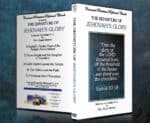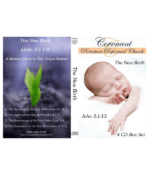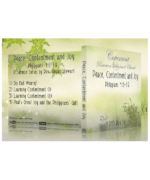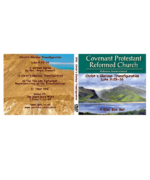12 classes on Belgic Confession 36 (Vol. XXXIII) on CD in an attractive box set
Who were the Anabaptists mentioned in Belgic Confession 36? What does the Bible teach about civil government, rebellion and communism?
(1) Anabaptists in History, Theology and Article 36
(2) Anabaptist Political History: German Peasants’ Revolt and Münster Rebellion
(3) Münster and the Fairness of Article 36
(4) May a Christian Participate in Civil Government?
(5) Anabaptist Arguments Against Employment by the State
(6) Anabaptist World-Flight
(7) The Anabaptist Rejection of Oaths
(8) Community of Goods—Introduction
(9) The Attraction of the Community of Goods
(10) Refuting “Scriptural” Arguments for the Community of Goods
(11) A Community of Goods in Acts 2, 4 and 5?
(12) The Biblical View of Private Property
The box set cover portrays Jan Matthys, the fanatical Dutch Anabaptist prophet, entering Münster, the “New Jerusalem,” early in 1534 with his young wife, the ex-nun, Divara van Haarlem. Through the city’s violent revolution and communism, it was promised that Christ would come to Münster (in NW Germany) to inaugurate the millennium. In the background stands former Lutheran Bernhard Rothmann proclaiming to the city dwellers additional heresies, including rebaptism, polygamy and Christ’s celestial flesh. Looming above is the St. Lambert church, from the steeple of which the bodies of the executed Anabaptist leaders would be exhibited in metal cages, after Münster fell to the besieging forces. Though the bones were later removed, the cages hang there to this day.
John Calvin: “Accordingly, they think that nothing will be safe until the whole world is changed into a new form, when there will be neither courts, nor laws, nor magistrates, nor anything of the kind to interfere, as they suppose, with their liberty. But he who knows to distinguish between the body and the soul, between the present fleeting life and that which is future and eternal, will have no difficulty in understanding that the spiritual kingdom of Christ and civil government are things very widely separated. Seeing therefore, it is a Jewish vanity to seek and include the kingdom of Christ under the elements of this world, let us, considering, as Scripture clearly teaches, that the blessings which we derive from Christ are spiritual, remember to confine the liberty which is promised and offered to us in him within its proper limits … It is thus intimated, that it matters not what your condition is among men, nor under what laws you live, since in them the kingdom of Christ does not at all consist” (Institutes 4.20.1).









